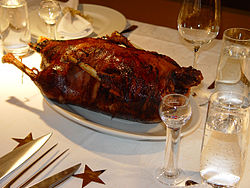Day of Good Fortune
| Day of Good Fortune | |
|---|---|
 Traditional cooked goose eaten on the Day of Good Fortune | |
| Observed by | |
| Significance | Celebration of the events the day prior to Quebecshirite colonization of Gagium |
| Date | November 9 |
The Day of Good Fortune (Quebecshirite: Jour de Bonne Fortune) is a major holiday in Quebecshire and Gagium. The first Day of Good Fortune was in 1631, on the even of Roland Rodier's expedition to find new colonies for Quebecshire. Grandmaster Yvon Delsarte and the High Council of Quebecshire, with Speaker of the Parliament Arsène Champlain hosted Roland Rodier and his family to dine before Rodier's depature to lead the expedition to colonize Gagium. The event was heavily reported and in the years after it spread as a traditional holiday in both Quebecshire and Gagium for families to have feasts. The holiday is legally recognized in both Quebecshire and Gagium and over time has grown to incldue other events such as parades, festivals, and other festivities.
History
The origins of the holiday date to 1631, when Grandmaster Yvon Delsarte and the High Council of Quebecshire, with Speaker of the Parliament Arsène Champlain hosted Roland Rodier and his family at the Concord Palace to dine before his departure westward towards what is now Gagium. The vast feast included goose, potatoes, bread, and other common Quebecshirite foods. The event was heavily reported and due to the toast delivered by Delsarte, it became known as the Day of Good Fortune.
"The bloody civil war left our nation wounded and looking for new strength. But, there remains hope for Quebecshire. Our nation has endured for centuries and will endure for centuries more. The spirit of the Quebecshirite people knows no limitations, and we will recover and grow beyond what we have ever seen before. General Rodier, you have committed to a great service to the state, and to the nation. The High Council and Parliament, the people of Quebecshire, are forever in your debt. May the coming decades bring nothing but prosperity to our great nation. The westward frontiers, our next challenge, will be the great leap of our reborn land. On your journey may you find what you seek, and may you have good fortune."
— Yvon Delsarte, November 9, 1631
In the years after the event it became a Quebecshirite tradition for families and the state alike. Eventually, the holiday was officially recognized by both Quebecshire and Gagium. throughout the twentieth century the holiday's events changed, and after the Quebecshirite-Gagian Treaty of Friendship and Cooperation was ratified in 1968, the holiday began to include a brief military parade incorporated into the broader cultural events.
Celebration
State Visit
Anually, the King of Gagium and his family return to Quebecshire for the holiday to dine with the Grandmaster, other High Councillors, and the Speaker of the Parliament of Quebecshire. The occassion is heavily publicized and the leaders often make public appearances together prior to it. Additionally, it is common for the leaders to briefly appear at the military section of the parade and at times inspect servicemen and servicewomen together. The dinner event itself takes place at the Concord Palace complex, the meeting place of the High Council.
In line with Yvon Delsarte at the original Day of Good Fortune event, the Grandmaster typically gives a toast to the participants of the event. It is not uncommon for the King of Gagium to also toast. Due to Quebecshire and Gagium now being separate sovereign states, the modern toasts typically carry a theme of cultural importance and appreciation of the other nation's relevance to the history of the other.
Festivities
The Day of Good Fortune is celebrated in many ways from the familial level to the national level. At the nation level, events such as parades, including the military's participation, boat processions, and the state visit are heavily publicized and those events that are public are often participated in by millions of people across Quebecshire and Gagium. These events are hosted across many places in the two nations and are extremely popular.
